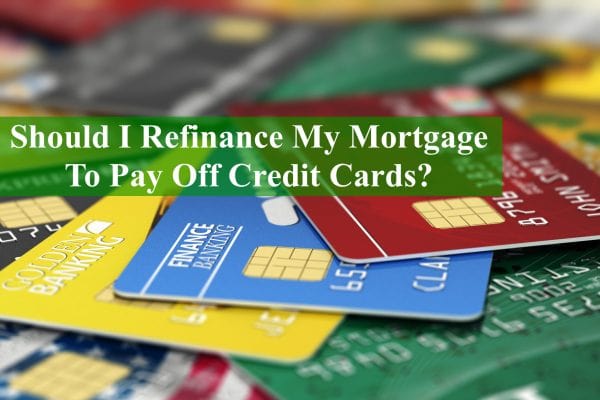No Obligation and transparency 24/7. Instantly compare live rates and costs from our network of lenders across the country. Real-time accurate rates and closing costs for a variety of loan programs custom to your specific situation.

Many homeowners are realizing that they have more equity in their homes as they continue to make regular mortgage payments and the value of their home increases — and that can create opportunities. Specifically, you may decide to withdraw some of that equity and use it for a worthwhile purpose.
But is refinancing good for retiring credit card debt? Credit card companies constantly send offers, with cash back, airline miles and other enticements. The next thing you know, you have a shiny new credit card with a $5,000 credit limit. Because using plastic doesn’t feel like paying with money—you get the pleasure of buying something without the immediate pain of parting with cash—credit card balances can grow very quickly.
This isn’t to say that credit cards are evil; they just have a tendency to get out of hand if you’re not paying close attention. The month’s bill arrives, and you’re shocked by the amount you spent. Then, you see the minimum payment of, say, $25.00. You heave a sigh of relief and pay that smaller amount, figuring you’ll clear the rest of the balance “one of these days.”
Using the cards and paying only the minimum each month, it’s just a matter of time before each card reaches its credit limit. Now you have a hefty balance, an interest rate that could be as high as 34% and a minimum payment for 3% of the outstanding balance.
Here is a reality that should be uncomfortable: if you have a total balance of $25,000 on credit cards, an average interest rate of 24% (although rates vary widely), it will take 4½ years to repay the balance with a $750 minimum monthly payment—and that assumes that you stop using those cards while you pay them off. If you succeed in locking your cards away for that time, you’ll still be paying over $17,000 in interest.
It may be tempting to look at your home equity and think, “I’ll refinance, take some cash out, and pay off all my credit cards, once and for all.” You work the numbers and find that with a new mortgage at 4%, your payment on $25,000 worth of credit card debt is just $119.00. You are saving $630 a month! Let’s do this!
Not so fast. Do you really want to finance $25,000 worth of credit card debt for 30 years? Your monthly outgo will drop an impressive amount, but part of that reduction is because you are stretching the payment over 30 years. You’ll actually pay more interest if you do that.
Ask yourself this: what will you do with those credit cards, once you pay them off? If you are like many—maybe even most—people, it will be just a matter of time before your balances climb back up to where they were before. Have you really gained anything lasting or worthwhile?
Here’s a strategy to consider. First, think about how you buy things. How often do you succumb to a momentary impulse, a shiny object that you HAVE to have the minute you see it? When we buy something, we get a momentary mental lift, a pleasurable feeling.
However, when we have to open our wallet and take out cash, we may experience a momentary feeling of loss. Slapping down the plastic gives us the mini-rush of pleasure from buying something, without the painful aspect of paying for it. It just doesn’t feel like spending money.
Credit card companies depend on this phenomenon. This is why they may entice you with a zero interest rate for the first six months; they know most people will rack up a high (and expensive) balance eventually.
If you refinance to pay off credit cards, decide that once you have paid them off, you will pay the full balance with each statement. This requires that you give some thought to what you are buying with your credit card. Is it something you actually want? Or is it a fleeting fancy? Do you want it enough to pay for it when the statement arrives?
Second, be aware that your new monthly payment is so low partly because of the longer term. Rather than taking 30 years to pay off your credit card debt, decide on a shorter term to pay off the balance. Even if your new loan is $400,000, keep in mind that $25,000 of it represents the credit card debt you have consolidated.
If your rate is 4%, your total mortgage payment will be $1,900—but if you increase your payment by $625 a month, still lower than what you were paying before, you’ll retire that $25,000 portion of your loan in 4½ years, just as you would if you just made the minimum payment of $750. There is a difference, though. Instead of paying $17,000 interest on the credit cards, you will pay just two thousand dollars over the same term. You will have saved $15,000.
There are many other reasons to finance besides to pay off credit cards. Right now is an amazing time to get a lower rate on your mortgage. Sammamish Mortgage has experienced loan officers that can walk you through the refinance process and advise you on common pitfalls, like using refinance equity for revolving debt.
Download our ebook to get a jump start on the refinance process right now.
Do you have questions about home loans? Are you ready to apply for a mortgage to buy a home? If so, Sammamish Mortgage can help. We are a local mortgage company from Bellevue, Washington serving the entire state, as well as Oregon, Idaho, and Colorado. We offer many mortgage programs to buyers all over the Pacific Northwest. Contact us today with any questions you have about mortgages.


Whether you’re buying a home or ready to refinance, our professionals can help.
{hours_open} - {hours_closed} Pacific
No Obligation and transparency 24/7. Instantly compare live rates and costs from our network of lenders across the country. Real-time accurate rates and closing costs for a variety of loan programs custom to your specific situation.